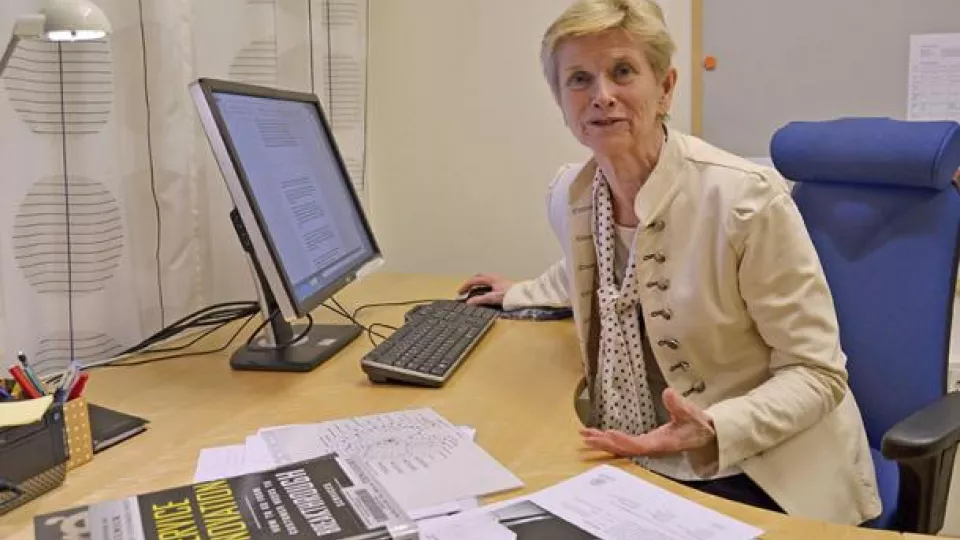What is the workshop about?
– I have held this workshop for the past two years at the Faculty of Social Sciences. It is aimed at students fromTthe Department of Service Management and Service Studies, The Department of Strategic Communication and now the Faculty of Engineering. The focus is on personal skills and self-awareness. To be able to answer the question "what can you do?".
– The first item on the program is "Harnessing your skills". Students add a lot of knowledge, skills and competences during their studies. They need to show employers that they know other skills beyond the purely disciplinary.
– You have to get the students to think of both their strengths and weaknesses. The question of weaknesses always arises at job interviews, so it is best to be prepared.
– After this the subject of "Networking and mentorship" comes naturally. Networking is so important to get the right contacts during their education. To answer job ads are one way to apply for a job, but a very large part of the recruitment is done through networks.
– The students will work on their own material, such as texts in application documents.
Can you tell us a little about your work with leadership?
– Broadly speaking, leadership is about management of change and development. Among a leaders' tasks is to get employees to grow. But, this is easier to talk about than to do in reality. Therefore this is also a course in practical leadership, besides the theoretical courses that students already have in the programme.
– I have been on the Department of Service Management and Service Studies since 2002 and have been responsible for several courses but I want to especially emphasize the course "Learning and Leadership" (in swedish "Lärande ledarskap"), where students learn coaching techniques as tools for their practical leadership.
– Why wait to take a leadership course until you reach a leadership position at around 40-50 years of age? My idea is that it is important to learn about practical leadership during university studies and therefore I started this freestanding course for students.
– Many scientists argue that the leadership in recent years has shifted from the authority of the position to authority through leadership. It is about acceptance, not only from the expertise but also from having good management skills and to be an innovator for change and development.
– In the 80s I was researching about Swedish establishments strategies in firms and procurement policies in Southeast Asia and India, and I noticed the importance of cultural values that characterized the management and business of each country. Awareness of cultural differences make it easier for Swedish managers working in these countries. It is interesting to see how leadership is done in such organizations. I am very interested in Cross Cultural Management. I have also worked as a consultant in leadership development at large international companies and as a guest lecturer at universities in Eastern Europe.
What else have you worked with?
– I am a Master Certified Coach (MCC) at the International Coach Federation, which has around 20,000 members. MCC is the highest level to achieve and there are only about 300 people who have this title. I am also one of 35 people who examine the candidates applying for a certification at all levels.
– The word "coach" can be used in so many contexts, especially in sports, but in this case it is the subject of an education with a degree. I went to the US for this education. Since then I have among other things worked as a self-employed consultant, coaching executives at companies to become better leaders.
– Coaching is not about therapy and advice, but it can be pretty tough. It can for example be about salespersons who do not deliver as expected, perhaps in the automotive sector. The seller needs to figure out how he or she can get better in their customer meetings. Coaching is also about customer meetings - the salesperson is my customer and the value he or she gets is how to create better value and better results in their customer meetings. It is tough to force yourself to think outside of the box - to use knowledge and resources that already excists, but that could be used more efficiently.
– My task in coaching relationship is to help them deliver. The method is through conversation with a focus on self-knowledge and that he or she sets up goals to implement them. The most important thing is what is done between the coaching sessions.
– I have also started the Supplemental Instruction (SI) groups, where students help other students to achieve better academically results. In this instanse, I train the students that are SI mentors to the use coaching methods and to create value for students who need help.
What is next for you?
– I am planning a research project on effective learning environments as part of a healthy organization. What is effective learning environments characterized as? What other factors besides learning and leadership are essential to the well-being and health in educational settings? Relatively little has been documented on the subject of health promotion approach in university environments.
– I want to further develop the concept of leadership, learning and health. Some ideas will tie in with what I wrote in my dissertation ("Implementation of strategic changes - how does new knowledge emerge?").
Text & photo: Lars Ljunggren
Translation: Hannah Magnusson


